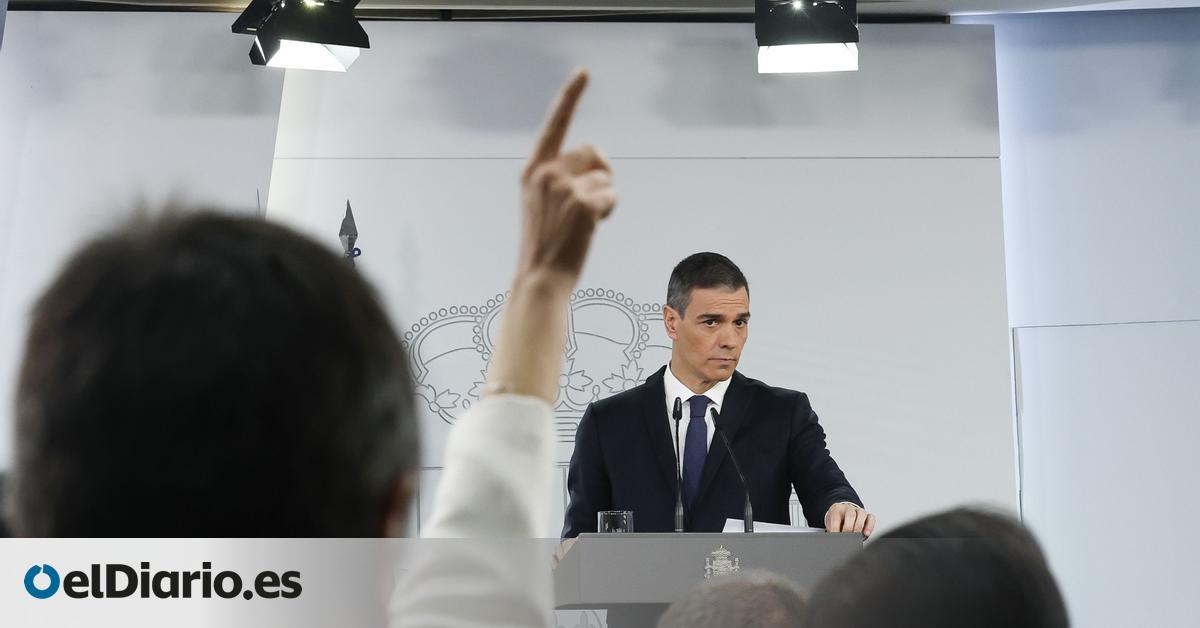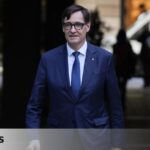
The commitment was dated in 2029, but it will be fulfilled this year because Spain thoroughly steps the accelerator to reach the 2% border of its gross domestic product in defense spending in 2025. In the midst of the new international context and the pressure of both European partners and the Atlantic Alliance and the United States, the Executive approved on Tuesday in the Council of Ministers a millionaire plan that had the explicit rejection of the five members of Sumar, the coalition partner of the PSOE. In total, before the end of the year, almost 10,500 million euros will be allocated from budget readjustments.
“If they had asked me a few years ago about my expense and investment plans in defense, my response would have been different. But it is not that we have changed, it is the world who has done so,” the president justified his course to insist that, in any case, that new roadmap is not incompatible with a reformist agenda for strengthening the welfare state.
“2% of GDP for defense expenditure is a commitment acquired by the previous administration, which left it by 0.9%. We have increased that effort to 1.4% and has not been an obstacle to increase social spending by 120,000 million or by 30,000 million the fight against climate change,” he defended.
The plan, which will now be sent to NATO, has been coordinated by the president’s closest team in La Moncloa and has had the work of up to half a dozen ministries. And it has also been fruit, according to Sanchez himself during his appearance, of a permanent interlocution with community institutions, with other European countries and with NATO herself. Last week, in addition, the United States Secretary of the Treasury, Scott Besent, also requested during his meeting in Washington with the Spanish Economy Minister Carlos Corpora, that Spain increases the expense dedicated to defense.
Budgets without going through Congress
During his speech, the president of the Government drew “a change of era”, in reference to the rise of leaderships such as Donald Trump, which puts the global geopolitical rules of the last decades, or threats such as Vladimir Putin’s, which ensured that they are limited to the whole of Europe. “It is time to take the reins of our own destiny,” he said to highlight three main objectives: “Strengthen our security and our defense, reindustrialize and give a new technological impulse to our economy and consolidate Spain as a central actor in the European Union.” And detailed up to five different points of that plan.
The first, a game equivalent to 35% of the total amount of the 10,471 million aimed at “improving the working conditions of the troop and the sailor, improving its preparation conditions and also modernizing the equipment of the armed forces”. In the second point, the industrial and technological plan for strengthening security and defense includes 31% of the investment “to prepare, manufacture and acquire new telecommunications and cybersecurity capabilities” because, as explained, “Spain is object every year of a thousand cyber attacks to essential services and infrastructure, which affect the operability of hospitals and airports”.
The third game is what refers to strictly military investment and the one that supposes a total discrepancy between members in the Council of Ministers held on Tuesday. Specifically, it is an investment of 19% of the total expenditure to “the manufacture and purchase of new defense and deterrence equipment” since those that are “more efficient and safer.” That is, to weapons and combat equipment. “We do not do it to attack anyone. Spain is a pacifist country that believes in diplomacy, which believes in international relations, which believes in multilateralism. We do it to deter those who may be thinking of attacking or attacking Europe,” said Sánchez.
The fourth and fifth points of the approved plan generate less friction within the coalition, according to the sources consulted in the Moncloa that, in any case, subtract political transcendence from a discrepancy “managed with respect by both parties.” These items include 2,750 million euros to “reinforce the capacities of our armed forces in the management of emergency and natural disasters such as floods or fires” with the expansion of the fleet of rescue helicopters, the acquisition of new vehicles, cistern aircraft or a new hydrographic ship. And also the improvement of the security conditions of the almost 3,000 troops that make up the 16 peace missions that Spain currently performs abroad under the United Nations flag, of the European Union or also of the Atlantic Alliance.
Questioned by the origin of the funds that will now be used for security and defense, and taking into account that the Executive has refused to present a budget project for this year in the absence of parliamentary support, the president explained that the money will proceed from three fronts: from the reorientation of the European funds, of the savings generated “by the management of this government and that in 2024 a growth that exceeded the forecasts that exceeded the forecasts of all international organizations” And finally “of the margin that certain items that were included in the budgets of 2023”.
“With all these mechanisms and remnants, the Government will fulfill its commitment without affecting social spending,” insisted the president, who explained that, precisely because it is these formulas, the plan will not require its validation in the General Courts. “From a material and legal point of view, it is not necessary to pass this budget allocation by the Cortes because it does not demand any additional effort,” he said after referring to articles 97 and 104 of the Constitution that address the separation of powers and explain “what are the legislative functions and which the executives.”
Add and partners oppose the increase in spending
The response of adding to the enormous plan has not taken long to arrive. Knowing that the Council of Ministers would approve a departure of that size, the second vice president of the Government, Yolanda Díaz, as he has given the position, prepared a sheet with observations as he claims not to share any of the five ministers of the minority partner of the coalition.
Although the government has approved several items to increase military spending in the last two legislatures, compromised by Sánchez on Tuesday implies reaching 2% of GDP that NATO demands this year. That is why adding observations have been especially hard: they qualify the increase in “exorbitant” and ask Sánchez to withdraw it.
In the text of these observations, to which Eldiario.es has had access, the second vice presidency ensures that “an investment in defense of this draft by the Government of Spain is not considered timely or convenient for not being motivated or adjusting to an exhaustive analysis of needs.”
Sources from the department led by Yolanda Díaz consulted by this newspaper indicate some positive points. For example, they defend having achieved that this increase does not involve any cut of social spending. And that more than 80% of the total money invested will be intended to improve the salaries of the troops or infrastructure related to cybersecurity.
The problem is mostly in the third departure of the approved plan. A total of 18.75% of the more than 10,500 million (approximately 2,000 million), which will be destined for “manufacturing or purchase of new defense and deterrence instruments.” “It is not known with the necessary precision the destiny that will be given to the expenses whose approval is intended, or if these are adjusted to the needs identified in terms of capacities to reinforce and guarantee of strategic autonomy,” warn the observations of adding.
The coalition of Yolanda Díaz warns of the “obvious risk” that the expense “compromises the principles and objectives of our foreign policy.” “In particular, the purchase of any war material to Israel would be inadmissible, not only for its genocide activity of the Palestinian people, but also attending to the property of the patents of this type of war material,” the observations point out. It is the thirteenth time between the last two legislatures that the minority partner presents this type of objections to the increase in military spending.
United Left, which has a ministry within the government, has also unmarked the increase in spending. The leader of the formation, Antonio Maíllo, has criticized the Socialist Party for promoting this new departure “without deliberation” within the Government. “It is not in the investiture agreement and is not in the spirit of 23j,” he said. The question of the increase in military spending is especially sensitive to this organization, which was born in the 80s precisely in the heat of citizen demonstrations against the entry of Spain into NATO.
Other formations of the Plurinational Parliamentary Group, such as Compromís, have denounced that while it increases items destined to buy war material, the government has re -cut the diplomatic personnel, as deputy Alberto Ibáñez has denounced.
We can, against the “Government of War”
The increase in military spending does not meet at all the consensus of parliamentary partners. The Socialist Party is aware because it was evident in the last appearance of Pedro Sánchez in Congress. And the crack in this matter between Sánchez and the block that facilitated the investiture has been exposed on Tuesday after the announcement. The first and most forceful to criticize the measure has been Podemos, which for months has initiated a path of disconnection with the Executive, which he has already accused on successive occasions of being the “Government of War.”
The general secretary of the party, Ione Belarra, called a citizen mobilization on Tuesday to change the direction of the rearme. The leader of Podemos appealed to those who demonstrated 20 years ago with ‘No to War’, in a way of equating the decisions that this government is making in the field of foreign policy with the decision of former president José María Aznar to put the country in the Iraq war.
EH Bildu and even ERC, which in recent weeks had contemplated more in the issue of spending increase, have criticized the latest government movements. Republican spokesman Gabriel Rufián accused the president of taking advantage of Pope Francis to announce the measure. “Sánchez in its purest form. Good tribute to the first anniversary of his 5 days of reflection,” he wrote in a message on social networks.
Although EH Bildu asks to wait to set a definitive position when more details of the plan are known, sources from the parliamentary group make it clear that they do not share the increase in defense spending, as they have already advanced weeks in Congress. “We reaffirm that we are not going to support the expense in military acceleration. Not at all. If someone believes that the future goes to reduce social spending and manufacture weapons, that is not the Europe for which EH Bildu bets,” they defend those sources.
“What the state government is doing, as does the whole of the European Union, is to fulfill what Trump is asking to do: spend more in defense and buy more weapons from North American companies,” the BNG deputy, Néstor Rego, has transferred for his part.
Source: www.eldiario.es

